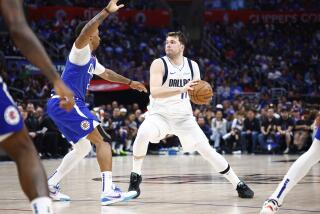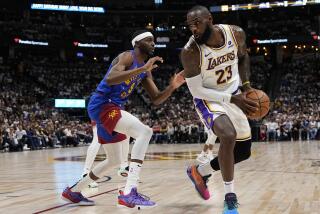NBA season in jeopardy as players’ union begins to disband
- Share via
The prospects for a 2011-12 NBA season might have ended Monday.
The 138th day of the NBA lockout failed to land a deal between players and owners, prompting Commissioner David Stern’s ominous midday statement that the season was “now in jeopardy.”
The players’ union began the process of disbanding and filed a “disclaimer of interest” so it could soon deliver a more weighty document — an antitrust lawsuit against the NBA in which players could claim the league conspired to prevent them from marketing themselves and making a living.
The players’ union will be classified as a trade association, and its executive director, Billy Hunter, sounded grim in an NBA TV interview, saying there was a “high probability” there wouldn’t be a season.
The full gravity of Monday’s actions won’t be known until rhetoric quiets and both sides can decide whether they are so far apart that it is worth skipping an entire season.
The “disclaimer of interest” is an expedited version of decertification, which would have required a player petition and then a player vote mandated by the National Labor Relations Board. With the disclaimer, players can sue the league immediately. Hunter said a lawsuit would be delivered to a district court by Wednesday.
As the collective bargaining process is replaced by court proceedings, players and owners will be replaced by lawyers. In fact, lawyers for both sides might eventually be directed by a judge to try again to reach an agreement.
Union President Derek Fisher said the decision to file a disclaimer was unanimous among player representatives for all 30 NBA teams at a Monday meeting in New York. Players concurrently rejected the latest owners proposal, which called for a 50-50 split of basketball revenue and several peripheral issues they found unsatisfactory, including shorter contract lengths and less money in general toward player contracts.
Players made 57% of basketball revenue last season.
“A lot of individual players have a lot of things personally at stake in terms of their careers and where they stand,” Fisher said. “Right now they feel it’s important … that we’re not only trying to get a deal done for today, but for the body of NBA players that will come into this league over the next decade and beyond.”
Most players would have received their first paychecks of the season Tuesday.
Stern blamed Hunter for the decision to disband the union, calling it a “sham,” a “charade” and an “irresponsible action at this late date.”
“We’re about to go into the nuclear winter of the NBA,” Stern said in an interview with ESPN.
The NFL players’ union, by comparison, took a similar action a month after its lockout began this year, ultimately canceling only one exhibition game before the sides reached agreement in July.
Stern called the NBA players’ decision a poorly thought-out negotiating ploy.
“They seem hell-bent on self-destruction, and I think that’s very sad,” Stern said.
The NBA had already canceled games through the end of this month, and more cancellations were expected soon.
Some legal experts were surprised that the players would not file a request for an injunction, a move that might have eventually ended the lockout if a judge agreed with the motion. Then there would have been settlement discussions between the parties under court supervision while players were hypothetically playing.
“One theory could be that they think this would scare Stern,” said Bill Gould, a Stanford law professor and former NLRB chairman. “That’s really an extraordinary gamble.”
Players’ contracts could be deemed void because their union decided to dissolve, though it was unlikely the NBA would take such an action.
On the other hand, Stern said owners would not be bullied into going back to the negotiating table.
“That’s not happening,” he said flatly.
The lawsuit will be filed in a district court of the players’ choice, probably New York or Los Angeles.
“It’s clearly an attempt by players to gain leverage,” said Gabe Feldman, a law professor and director of the Sports Law Program at Tulane University. “Up until now they’ve been playing defense. This was their only opportunity to go on the offensive and exercise some of their muscle. The question is, how far does the disclaimer and subsequent antitrust litigation have to go to bring the sides together?”
The maneuver is high-risk, high-reward, Feldman said. With the ball in the hands of the courts, players might ultimately be forced to take a worse deal than the one presented to them now if their lawsuit is thrown out.
The NBA’s 439 players were never asked to individually vote on the last proposal from owners. The 30 player representatives collected feedback from their teammates and relayed it to the union Monday before deciding to file the disclaimer.
“I think if they had taken it to a vote [of all players], there was enough of a groundswell to where they would have approved it,” a high-ranking league executive said. “That’s why [Hunter] didn’t do it.”
The players’ association said it would add seasoned litigator David Boies to its legal team. Boies represented Al Gore after the 2000 U.S. presidential election and aided the U.S. Justice Department against Microsoft in a 1998 antitrust lawsuit. Curiously, Boies was on the other side of the legal court in the NFL players’ antitrust lawsuit, representing owners this year.
Hunter now becomes a member of the players’ legal team along with Boies and players’ union attorney Jeffrey Kessler. Fisher will not be directly involved in the legal negotiations.
“This train for now will be driven by the lawyers,” Feldman said.
Stern had hoped to persuade players to accept a 72-game season that started Dec. 15.
Now there’s no guarantee of a season at all.
Bresnahan and Turner reported from Los Angeles.
More to Read
Go beyond the scoreboard
Get the latest on L.A.'s teams in the daily Sports Report newsletter.
You may occasionally receive promotional content from the Los Angeles Times.












